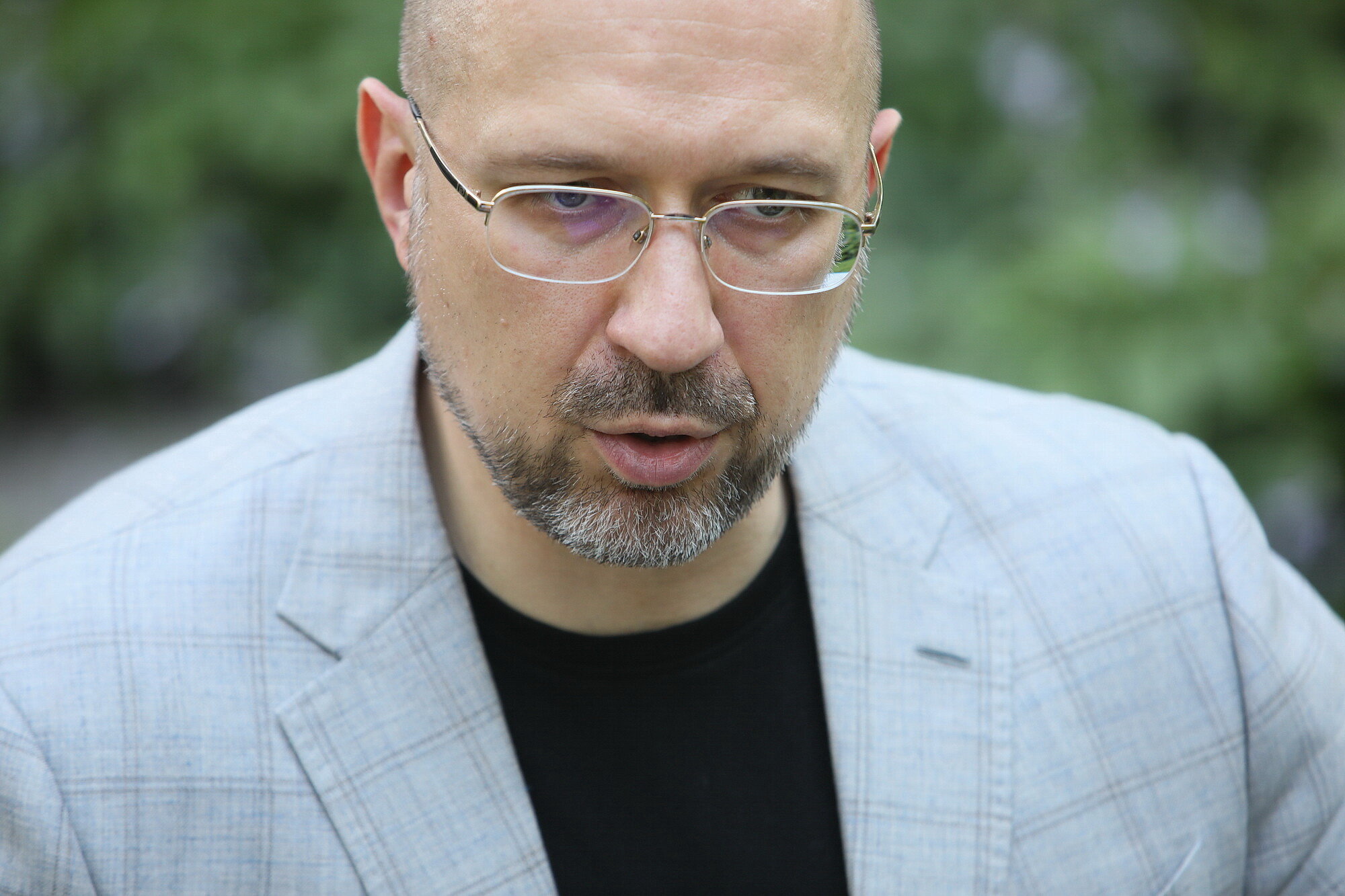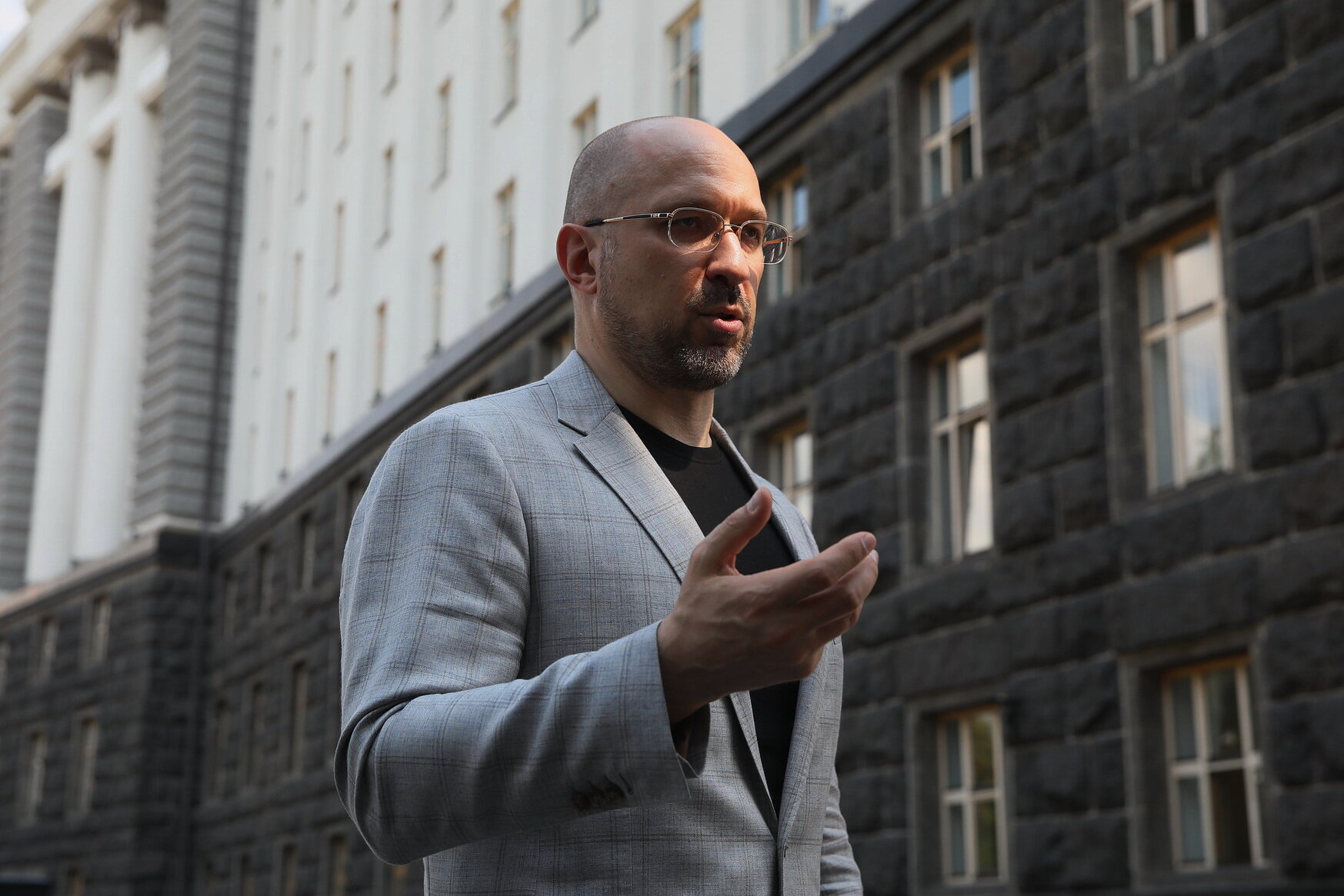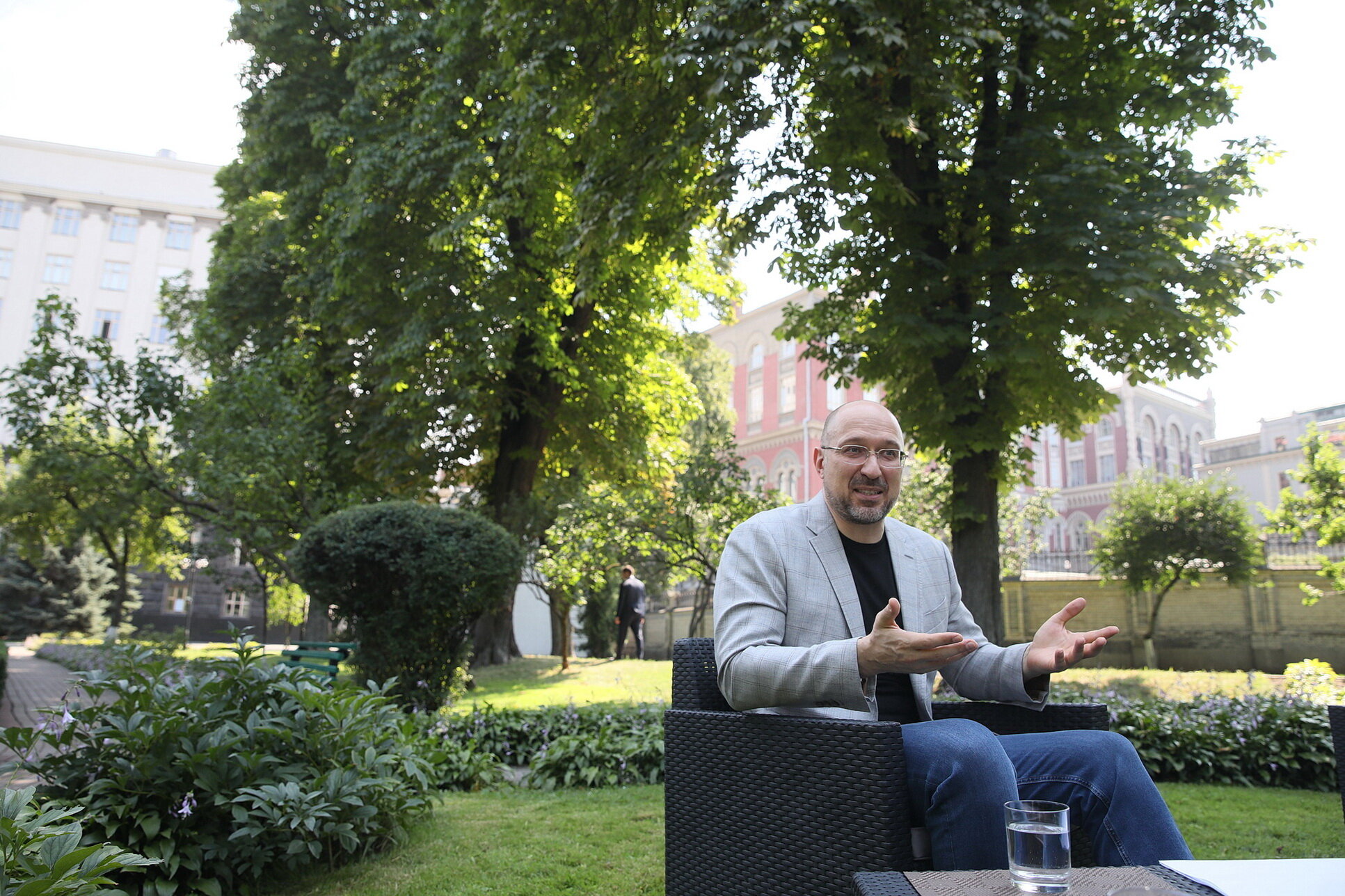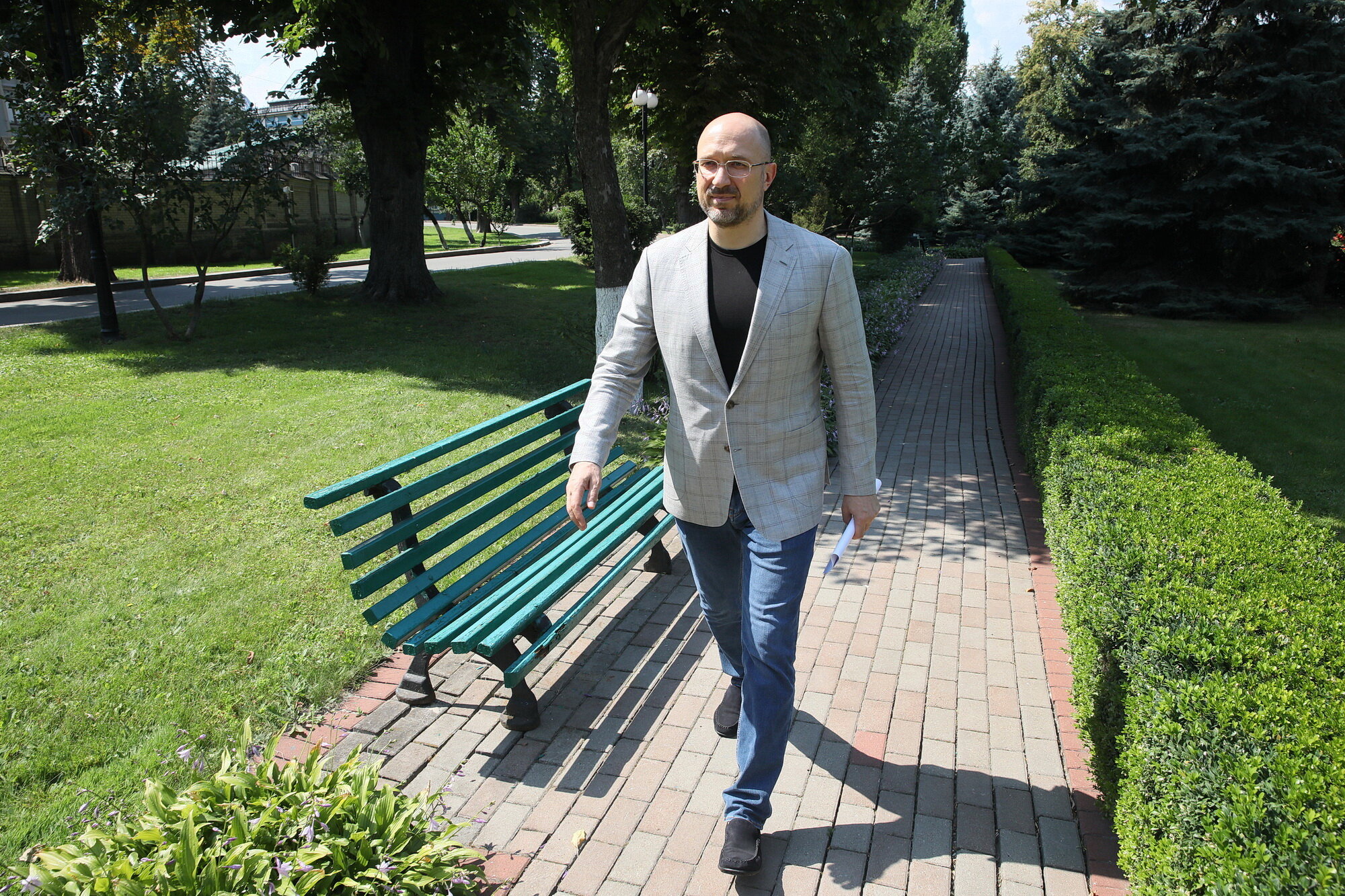When Denys Shmyhal was sworn in March 4 as the 16th person to be prime minister of Ukraine, he didn’t expect it to be easy.
But he couldn’t have known how hard it would be.
A day before, the first case of COVID‑19 was reported in Ukraine. Within days, Shmyhal, a newcomer to the central government, faced an unprecedented choice: whether to impose a strict lockdown on the whole country, which in the best of times has a fragile economy. The quarantine would sink Ukraine’s economy into recession, which it did.
“It was the hardest decision of my life,” Shmyhal recalled in an interview with the Kyiv Post on Aug. 7.
Under Shmyhal, the government moved quickly, by mid-March, and likely saved Ukraine from an explosive outbreak of COVID‑19. Five months later, Ukraine ranks an enviable 80th in the world by the number of deaths per 1 million members of population — only recently approaching the 2,000 mark.
But many other challenges remain.
The number of daily infections continues to rise, Ukraine’s economy continues to suffer from the pandemic and the upcoming local elections in October are an early test of whether this prime minister can survive politically.
Rise to the top
Shmyhal doesn’t make it easy for people to define him. The 44-year-old shuns the spotlight. The public knows little about his views and beliefs.
That’s because he wants to spend more time governing than talking, he says.
“Not being present in the media, in politics — it frees up a lot of time,” he says. “Politics, populism and ratings are distracting factors that undermine your effectiveness as a manager.”
He says he’s not a politician, but certainly speaks like one. After questions, he pauses to think, then answers slowly and carefully. Out of his many predecessors, he resembles a less domineering Arseniy Yatsenyuk more than anyone else.
He is the 16th person to serve in the role and only the second one to come from western Ukraine.
A native of Lviv and an engineer by education, Shmyhal spent most of his career as a business executive in various sectors. He had a stint in local government, working in mid-level management positions in 2009–2014, before returning to the private sector. He unsuccessfully ran for parliament as an independent in 2014.
His latest employment, in 2018–2019, was as the director of a major power station, owned by billionaire oligarch Rinat Akhmetov’s DTEK energy company.
When Volodymyr Zelensky won the presidential election in a landslide and vowed to fill the government with “new faces,” Shmyhal decided to give public office another try — and hit the jackpot.
He won the competition to become governor of Ivano-Frankivsk Oblast in August 2019. Impressed by his performance, Zelensky and then-Prime Minister Oleksiy Honcharuk in February invited him to join the government in Kyiv as deputy prime minister.
Only a month later, Shmyhal replaced Honcharuk in the top chair. Even by Ukrainian standards, it was a lightning-fast rise.
Relationship with Zelensky
Even before the appointment, insiders told Ukrainian media that Zelensky was completely charmed by Shmyhal and was favoring him for the job.
It’s easy to see why.
In early 2020, before the pandemic hit, Zelensky was busy reshuffling his administration and government. After months of infighting, gone was Andriy Bohdan, his tough-guy chief of staff. Honcharuk fell from grace after a leaked recording showed him speaking disparagingly about the president.
Amid this discord, the calm and unproblematic Shmyhal must have been a welcome contrast for Zelensky.
That charm still lasts, apparently. As Shmyhal sat for an interview with the Kyiv Post in the garden of the Cabinet of Ministers building on Aug. 7, he praised Zelensky.
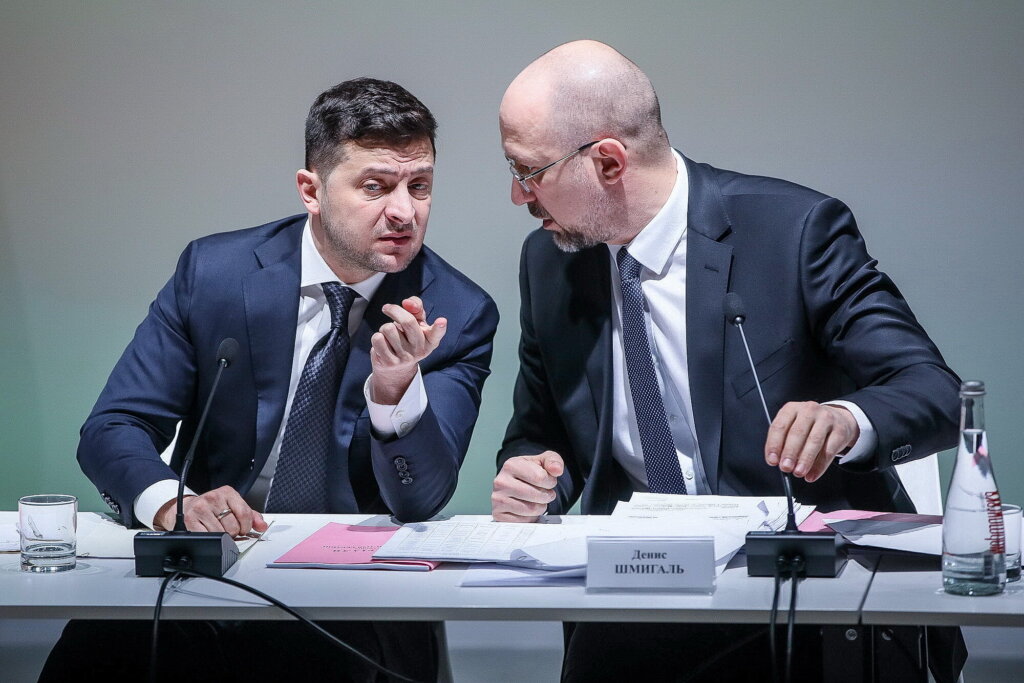
Ukrainian President Volodymyr Zelensky (L) and Prime Minister Denys Shmyhal talk during a special government meeting at Unit.City innovation park in Kyiv on March 13, 2020. (Volodymyr Petrov)
“We have a wonderful relationship with the president,” Shmyhal said.
He is, of course, speaking about his boss. While a prime minister is de jure independent from the president, in reality, he is appointed by a parliament controlled by Zelensky, making him de facto a subordinate of the president. Shmyhal doesn’t seem to mind. He and Zelensky meet or speak on the phone nearly every day, he says.
“He keeps track of virtually everything in the government,” Shmyhal said of Zelensky.
Has he ever had to refuse something that Zelensky asked of him?
“This hasn’t happened yet. I’m sure he would never ask for something illegal,” said Shmyhal. “But we do have discussions. The best decisions are born that way.”
Fighting coronavirus
Although the first case of COVID‑19 was reported in Ukraine the day before Shmyhal became prime minister, he says he didn’t immediately know that the pandemic would so thoroughly define his tenure.
“I realized probably at the same time as everyone else did, when the first person died of it in Zhytomyr Oblast,” Shmyhal recalls. “Every government in Ukraine has had to bear its own cross. For someone, it was the war. For us, it’s the coronavirus pandemic.”
He follows the statistics meticulously and easily recalls the exact number of new cases reported on the day of the interview.
“I anticipate those numbers every morning, waiting to see them to finally start going down,” he says.
But they don’t go down.
In fact, Ukraine has been setting a record of new cases almost every day since the start of August. Out of the 86,140 cases registered in Ukraine since the start of the pandemic, almost half are active cases as of Aug. 13.
It comes as no surprise: Mask-wearing in public places and transport is decreasing, and the president himself is often seen without a mask.
“Unfortunately, people are tired of quarantine measures and didactic speeches about masks and social distancing. They are exhausted from all the tension,” he said.
The way to proceed, Shmyhal says, is to continue the “adaptive quarantine,” where restrictions vary in different regions depending on their infection rate.
“We need to balance the quarantine and our economy,” he said. “Eighty percent of people are more worried about the economy than the virus. They are more afraid to lose their job than to get sick. We are doing everything we can to be among the first ones to get the vaccine or the medicine once it is developed. The key thing is to decrease the mortality of this virus. The flu can also be deadly, but it has a mortality rate of less than 1 percent. Eventually, we must do the same to the coronavirus.”
Priorities
Ukraine has plenty of other problems that need urgent attention. Among them, and high on Shmyhal’s agenda: stalled health-care reform, a corrupt customs service and the unfinished reform of the education system.
In the nearest future, he wants to fix two notoriously corrupt government agencies: the Architecture and Construction Inspection, which oversees construction permits, and the state land register, also known as DerzhGeoKadastr.
“It’s a complicated and a very corrupt field,” he says of the land register. “We are approaching it through digitalization and hope to see the result in the foreseeable future.”
Roads are another priority. Zelensky and the government have prioritized road construction within the highly-publicized program branded as “The Big Construction.” Nearly Hr 100 billion, more than $3.6 billion, were allocated for the program in 2020, including from the latest loan from the International Monetary Fund.
Shmyhal wants Ukraine to have high-quality toll highways, too, like the German autobahns.
“It’s a crime against Ukraine that not a single ‘autobahn’ was built in 28 years,” he says. “Or that there is still no strategy for waste management. There are so many things that haven’t been done.”
Investors and corruption
According to Shmyhal, there are two missing components that stop investors when they consider investing in Ukraine: good transport infrastructure and rule of law — specifically, fair courts.
The good news is, one of those two components is under way.
The bad news? It’s not the courts.
“It’s easier to build roads than to reform our courts,” Shmyhal said. “Roads are relatively easy: You allocate the funds and control that they are well-spent. But courts … There needs to be a global upheaval of the court system that can’t be achieved in one year. It calls for a change in mentality.”
When it comes to corruption, Shmyhal talks about the mentality of the people more than about government institutions.
Ukrainians, he believes, need to develop intolerance to corruption, something that hasn’t yet happened.
“In Canada, once, the whole country protested after a finance minister delivered a report about economic downturn wearing expensive shoes,” he said. “This is an automatic reaction of the civil society that keeps officials under control. We are developing it.”
Shmyhal likely referred to British Columbia Finance Minister Carole Taylor, who was criticized for wearing $600 Gucci shoes when presenting the province’s budget in 2006. However, the Kyiv Post couldn’t confirm that it caused protests.
Just before the interview, the news broke that U.S. authorities are seeking to confiscate the property of billionaire oligarch Ihor Kolomoisky, who is suspected of money laundering in the U.S., but has never come close to facing any charges in Ukraine.
Shmyhal agrees that it is a testimony to the failings of Ukrainian law enforcement institutions, and compares it to the case of ex-Prime Minister Pavlo Lazarenko, who was convicted for money laundering in the U.S. in 2004 and served a federal prison sentence.
“Of course, it means that some institutions don’t work the way they should,” Shmyhal said. “The whole anti-corruption system in Ukraine isn’t perfect. It’s true for law enforcement, courts and government agencies. We need to conduct reforms that will eventually put a stop to corruption. We are doing so, but it will take a long time.”
Avakov
Shmyhal criticizes corruption in law enforcement in general but defends Interior Minister Arsen Avakov, one of the most notorious top officials.
Avakov has run the interior ministry since 2014. He oversaw a reform drive that was supposed to cleanse the force from corrupt and incompetent officers, but in fact, allowed many of them to stay.
As a result, scandals involving police officers committing horrendous crimes still happen. In 2019, officers killed a five-year-old boy while shooting in the street for fun. In 2020, other officers lured a woman to a police station to beat and rape her.
Still, Shmyhal claims that the fact that these cases even become known to the public is a welcome change.
“When the force is so big, with 300,000 people working in the Interior Ministry, there is a chance that there are scoundrels among them,” he says. “What they do, hiding behind their uniforms, is unacceptable. They deserve a brutal punishment.”
He doesn’t blame the interior minister for mismanagement though — in fact, he says that he is satisfied with the work of the National Police.
But Shmyhal may have limited capacity when it comes to overseeing the interior minister.
Shmyhal’s predecessor Honcharuk told the Kyiv Post that Avakov didn’t report to him, but directly to Zelensky, and that was Zelensky’s wish. Shmyhal denies that this is true for his Cabinet.
“None of the Cabinet ministers have a special status,” he said. “Some ministers participate in the work of the presidential administration, and I welcome it.”
His stance on Avakov was one of the reasons why the parliament didn’t support Shmyhal’s Cabinet program this June, refusing the prime minister a one-year immunity from sacking.
What’s next?
After Zelensky abruptly sacked Honcharuk after just six months in office, proving just how disposable prime ministers were for him, many thought that Shmyhal wouldn’t last too long, either.
“Who thought that?” Shmyhal asks, allowing himself a trace of combativeness. “I certainly don’t think about it. But I work every day like it would be my last day in the job.”
With the economy weak after taking the blow from the coronavirus, and local elections coming in October, popular speculation says that the prime minister would be the obvious scapegoat of choice for Zelensky.
Shmyhal denies ever discussing with Zelensky how much time he has. But, five months in, he makes it clear that he wants to stay as long as possible.
“I want to be remembered for bringing Ukraine closer to the European Union,” he said. “Maybe even joining it.”
That may take more time than what even Zelensky can give him.
